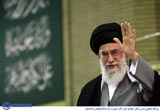Sunday
Jan102010
Latest Iran Video: Military Commander Mullen on US Options (10 January)
 Sunday, January 10, 2010 at 20:02
Sunday, January 10, 2010 at 20:02
[youtube]http://www.youtube.com/watch?v=vSWNFp2mSC0[/youtube]
 Sunday, January 10, 2010 at 20:02
Sunday, January 10, 2010 at 20:02  Sunday, January 10, 2010 at 9:43
Sunday, January 10, 2010 at 9:43  1950 GMT: An American Strategy? I really don't understand what the Obama Administration is playing at. At the same time as Administration officials are putting out the story that the US is moving to a "sanctions for rights" approach (see separate analysis), the top US military commanders are going on rhetorical red alert and talking about confrontation.
1950 GMT: An American Strategy? I really don't understand what the Obama Administration is playing at. At the same time as Administration officials are putting out the story that the US is moving to a "sanctions for rights" approach (see separate analysis), the top US military commanders are going on rhetorical red alert and talking about confrontation.NEW Latest Iran Video: Military Commander Mullen on US Options (10 January)
NEW Iran Special Analysis: A US Move to “Sanctions for Rights”?
NEW Iran: Challenge to The Government in “The Heartlands”?
The Latest from Iran (9 January): Watching Carefully
In the early days of the revolution the opposition based in abroad, monarchists, and his foes abroad stormed him with their verbal attacks. Now, unfortunately some people within the system make slanders against him and some media without paying attention to the remarks of [the Supreme Leader] keep on libeling him.
More than 145 people detained after Iran's disputed June election were kept for several days in a room of 70 square metres at a Tehran jail, including three who died, a parliamentary report was quoted as saying on Sunday....
It rejected the initial claim by officials, including then Tehran chief prosecutor Saeed Mortazavi, that the three deaths were caused by meningitis...."Their deaths are attributed to various issues such as limitation of space, poor sanitary conditions, inappropriate nutrition, heat, lack of ventilation and ... also as a result of physical attacks."
 Abbas Jafari Doulatabadi,
Abbas Jafari Doulatabadi,  Ali Larijani,
Ali Larijani,  Ali Motahari,
Ali Motahari,  Ayatollah Ali Khamenei,
Ayatollah Ali Khamenei,  Borzou Daragahi,
Borzou Daragahi,  Daftar-Tahkim-Vahdat,
Daftar-Tahkim-Vahdat,  David Petraeus,
David Petraeus,  Flynt Leverett,
Flynt Leverett,  Hashemi Fafsanjani,
Hashemi Fafsanjani,  Hillary Mann Leverett,
Hillary Mann Leverett,  Imam Khomeini Line,
Imam Khomeini Line,  Iran,
Iran,  Iran Elections 2009,
Iran Elections 2009,  Kahrizak Prison,
Kahrizak Prison,  Los Angeles Times,
Los Angeles Times,  Mahmoud Ahmadinejad,
Mahmoud Ahmadinejad,  Manouchehr Mottaki,
Manouchehr Mottaki,  Mehdi Karroubi,
Mehdi Karroubi,  Mike Mullen,
Mike Mullen,  Mir Hossein Mousavi,
Mir Hossein Mousavi,  Mohammad Hashemi Rafsanjani,
Mohammad Hashemi Rafsanjani,  Mothers of Mourning,
Mothers of Mourning,  Muhammad Sahimi,
Muhammad Sahimi,  Persian2 English,
Persian2 English,  Ramin Pourandarjan,
Ramin Pourandarjan,  Razi University,
Razi University,  Reuters,
Reuters,  Saeed Laylaz,
Saeed Laylaz,  Saeed Mortazavi,
Saeed Mortazavi,  Tehran Bureau in
Tehran Bureau in  Middle East & Iran
Middle East & Iran  Sunday, January 10, 2010 at 9:18
Sunday, January 10, 2010 at 9:18  The most interesting spin out of the US in recent days is in a Saturday article in The Wall Street Journal by Jay Solomon, "U.S. Shifts Iran Focus to Support Opposition".
The most interesting spin out of the US in recent days is in a Saturday article in The Wall Street Journal by Jay Solomon, "U.S. Shifts Iran Focus to Support Opposition".Secretary of State Hillary Clinton gathered over coffee at the State Department this week with four leading Iran scholars and mapped out the current dynamics, said U.S. officials. One issue explored was how the U.S. should respond if Tehran suddenly expressed a desire to reach a compromise on the nuclear issue. Mrs. Clinton asked whether the U.S. could reach a pact without crippling the prospects for the Green Movement.
 Afshin Molavi,
Afshin Molavi,  Brookings Institution,
Brookings Institution,  Carnegie Endowment,
Carnegie Endowment,  Council on Foreign Relations,
Council on Foreign Relations,  David Sanger,
David Sanger,  George Mason University,
George Mason University,  Haleh Esfandiari,
Haleh Esfandiari,  Hillary Clinton,
Hillary Clinton,  Iran,
Iran,  Iran Elections 2009,
Iran Elections 2009,  Jay Solomon,
Jay Solomon,  Karim Sadjadpour,
Karim Sadjadpour,  Mahmoud Ahmadinejad,
Mahmoud Ahmadinejad,  National Iranian-American Council,
National Iranian-American Council,  New America Foundation,
New America Foundation,  New York Times,
New York Times,  Obama Administration,
Obama Administration,  Ray Takeyh,
Ray Takeyh,  Shaul Bakhash,
Shaul Bakhash,  Suzanne Maloney,
Suzanne Maloney,  Trita Parsi,
Trita Parsi,  Wall Street Journal,
Wall Street Journal,  William Broad,
William Broad,  Woodrow Wilson Center in
Woodrow Wilson Center in  Middle East & Iran
Middle East & Iran  Sunday, January 10, 2010 at 8:19
Sunday, January 10, 2010 at 8:19  One of the running debates on Enduring America has been the extent of the demand for change across Iran. With most information, because of the nature of media and restrictions on communications, coming out of the capital, it has been hard to guage whether "the countryside" --- which is often framed as more supportive than Tehran of President Ahmadinejad --- will support calls of the opposition.
One of the running debates on Enduring America has been the extent of the demand for change across Iran. With most information, because of the nature of media and restrictions on communications, coming out of the capital, it has been hard to guage whether "the countryside" --- which is often framed as more supportive than Tehran of President Ahmadinejad --- will support calls of the opposition. Saturday, January 9, 2010 at 18:33
Saturday, January 9, 2010 at 18:33 The Latest from Iran (9 January): Watching Carefully